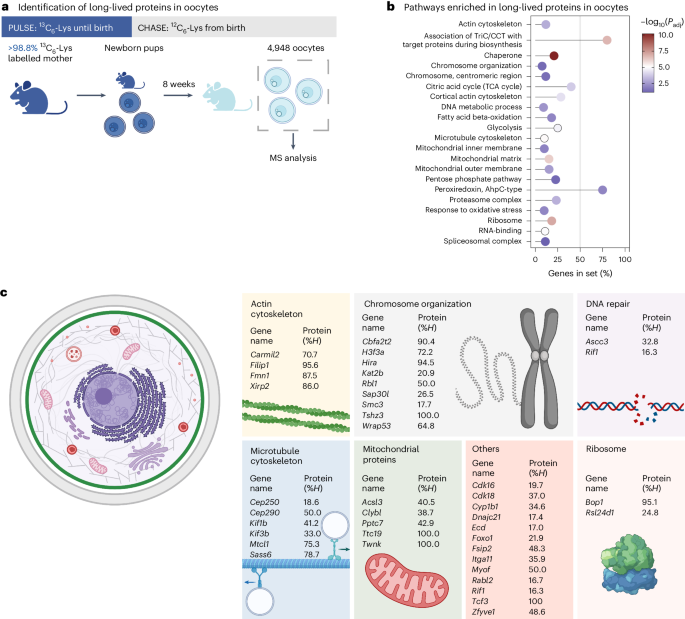2024-07-09 マックス・プランク研究所
<関連情報>
- https://www.mpg.de/22190551/0708-bich-egg-cell-maintenance-long-lived-proteins-may-be-essential-17216463-x
- https://www.nature.com/articles/s41556-024-01442-7
哺乳類の卵巣における卵子の維持には、極端なタンパク質の寿命が関係している The maintenance of oocytes in the mammalian ovary involves extreme protein longevity
Katarina Harasimov,Rebecca L. Gorry,Luisa M. Welp,Sarah Mae Penir,Yehor Horokhovskyi,Shiya Cheng,Katsuyoshi Takaoka,Alexandra Stützer,Ann-Sophie Frombach,Ana Lisa Taylor Tavares,Monika Raabe,Sara Haag,Debojit Saha,Katharina Grewe,Vera Schipper,Silvio O. Rizzoli,Henning Urlaub,Juliane Liepe & Melina Schuh
Nature Cell Biology Published:20 June 2024
DOI:https://doi.org/10.1038/s41556-024-01442-7

Abstract
Women are born with all of their oocytes. The oocyte proteome must be maintained with minimal damage throughout the woman’s reproductive life, and hence for decades. Here we report that oocyte and ovarian proteostasis involves extreme protein longevity. Mouse ovaries had more extremely long-lived proteins than other tissues, including brain. These long-lived proteins had diverse functions, including in mitochondria, the cytoskeleton, chromatin and proteostasis. The stable proteins resided not only in oocytes but also in long-lived ovarian somatic cells. Our data suggest that mammals increase protein longevity and enhance proteostasis by chaperones and cellular antioxidants to maintain the female germline for long periods. Indeed, protein aggregation in oocytes did not increase with age and proteasome activity did not decay. However, increasing protein longevity cannot fully block female germline senescence. Large-scale proteome profiling of ~8,890 proteins revealed a decline in many long-lived proteins of the proteostasis network in the aging ovary, accompanied by massive proteome remodeling, which eventually leads to female fertility decline.


